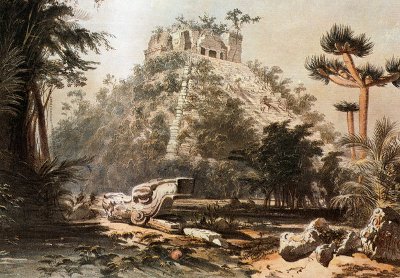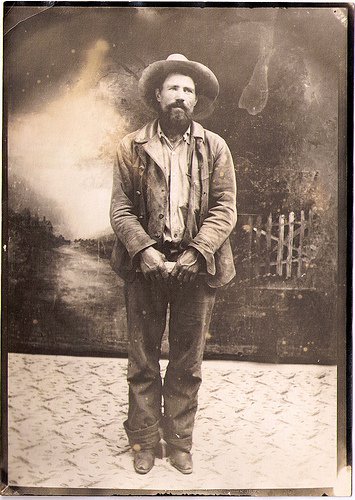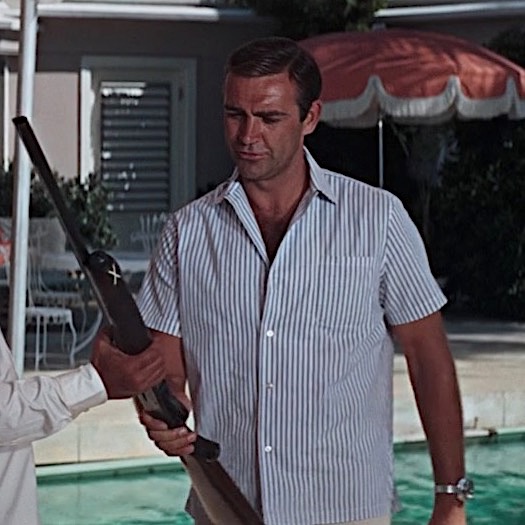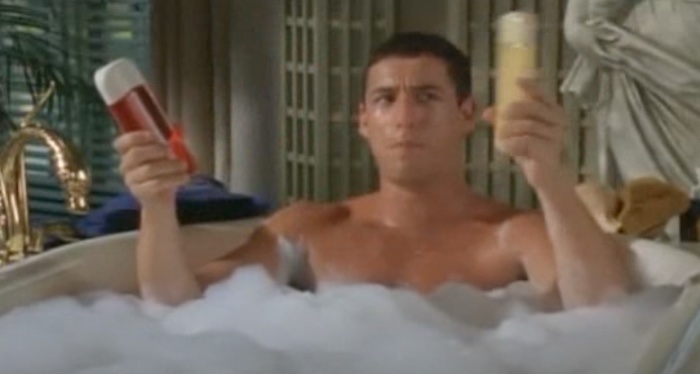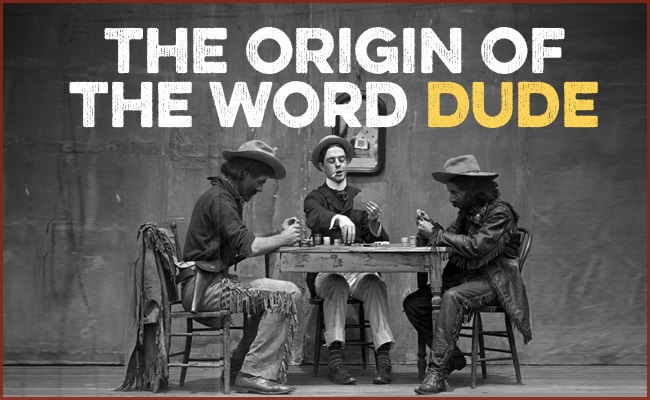
My go-to moniker for other men has long been “dude.”
“What’s up dude?”
“He’s a good dude.”
“Check out this dude over here.”
For me, a dude is a cool, laid-back, solid guy.
I’m not alone in my use of dude. It’s been widely employed by my fellow American men for decades.
But what’s the origin of the word dude?
I took a deep dive into its etymology to find out.
The Birth of the Dude
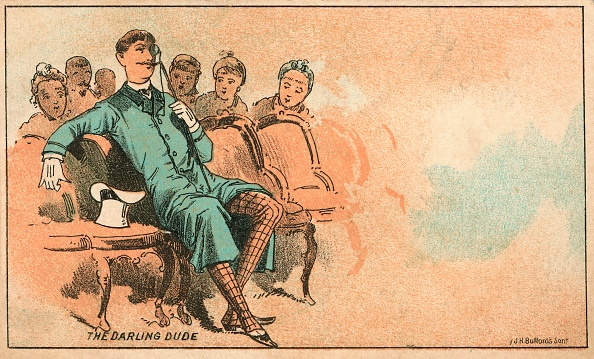
Thanks to tireless research by two etymologists, we know the exact date the word dude was coined.
Robert Sale Hill published a poem in The New York World on January 14, 1883, describing a type of foppish young man living in cities. These young men were overly fastidious about their clothing, professed an interest in avant-garde art, and smoked tiny cigarettes. They were the 19th-century version of the 21st-century hipster.
And like the hipsters of the 2010s, the dandies of the 1880s were a trope that the public loved to lampoon.
In the poem that Robert Sale Hill published, he called these fops “dudes.”
Etymologists Barry Popik and Gerald Cohen theorize that Hill derived the word “dude” from “doodle,” as in “Yankee Doodle Dandy.” The original New England Yankee Doodle, Cohen notes, “was the country bumpkin who stuck a feather in his cap and called it macaroni; i.e., by sticking a feather in his cap, he imagined himself to be fashionable like the young men of his day known as ‘macaronis.'”
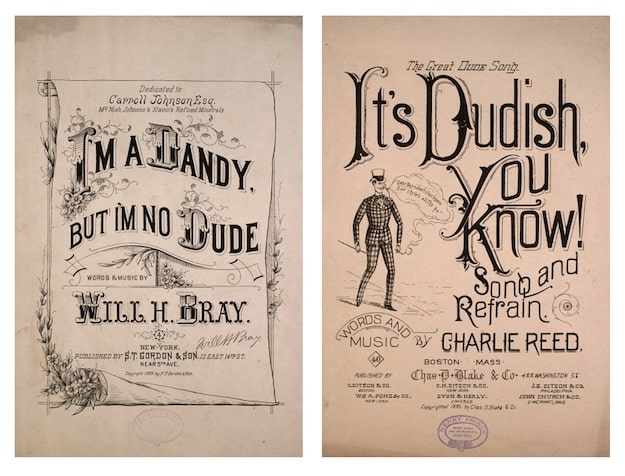
Songs, satirical in nature, were written about 19th-century dudes. “Dudish” as the adjective form of dude also came into use in the late 19th century and continued into the 20th. It’s still sometimes used today by older generations to describe a male who’s looking sharp and well-dressed.
After Hill’s poem about dudes was published in 1883, “dude” became the word of the year. Newspapers and magazines started writing about dudes and dude lifestyles. Typically, the aim was to make fun of these dudes as exemplified in another poem published the same year:
“What is the dude, papa?” she said, with sweet, inquiring eyes,
And to the knowledge seeking maid, her daddy thus replies:
A weak mustache, a cigarette, a thirteen button vest,
A curled rim hat—a minaret—two watch chains cross the breast.
A pair of bangs, a lazy drawl, a lackadaisy air;
For gossip at the club or ball, some little past ‘affair.’
Two pointed shoes, two spindle shanks, complete the nether charms;
And follow fitly in the ranks, the two bow legged arms.
An empty head, a buffoon’s sense, a poising attitude;
“By Jove” “Egad!” “But aw” “Immense!” All these make up the dude.
I like the reminder in that last line that youngsters have always had their set of slang that the oldsters found silly. Immense!
Don’t Call Me Dude, Pardner!
Thanks to newspapers and magazines, “dude” spread across the country. When ranches opened in the American West that catered to wealthy city slicker men from the East who wanted to experience the rough-and-tumble frontier in comfort, they came to be known as “dude ranches.”
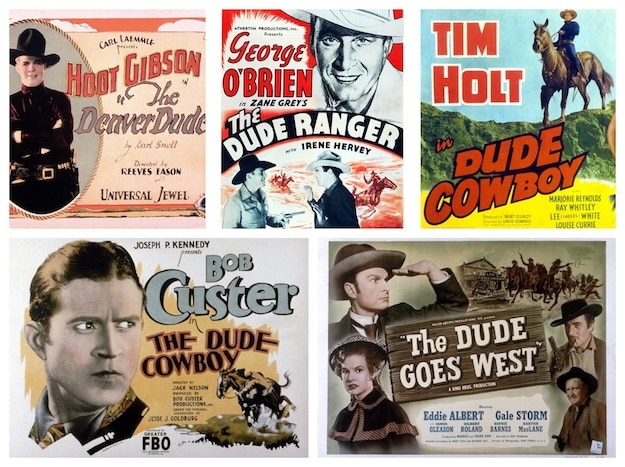
Movies with “Dude” in the title, featuring some variation of a citified man transplanted to the West, were very popular up through the mid-20th century.
Being called a “dude” was quite the insult in the West. It meant you didn’t have the grit, toughness, and knowledge to thrive on the frontier. It basically meant you were a soft pretender. When Theodore Roosevelt moved from high society life in New York City to the Dakotas to try his hand at wrangling cattle, he was often called a dude by the veteran, hard-boiled cowboys he encountered. Getting into bar fights and showing his mettle as a rancher quieted, though never entirely quashed, these accusations of dude-dom.
The Modern Dude
For the rest of the 19th century and into the beginning of the 20th, “dude” maintained its meaning as a “well-dressed man.” There were attempts to create a feminine version of dude by creating the word “dudine.” It never stuck.
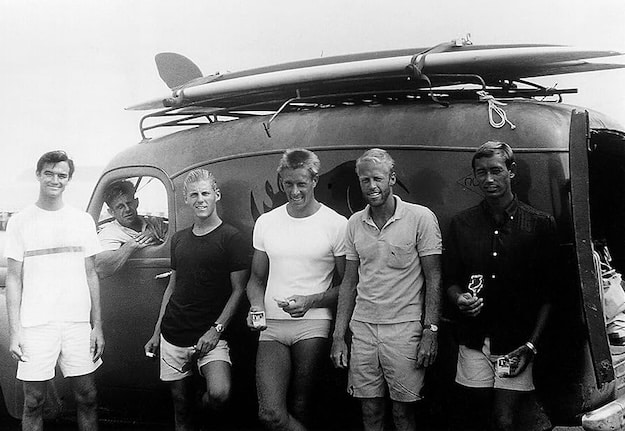
Prototypical surfer dudes.
As the 20th century progressed, various subcultures in the United States started using dude as a generic moniker for men. In the 1960s, “dude” gained prominence in surfer culture as a synonym for “guy” or “fella.” But it was a certain type of guy or fella, one who embodied the laidback ethos of surfer culture. The feminine “dudette” sort of took off during this time, but like its 19th-century dudine counterpart, it never caught on.
By the 1970s, dude was a common way to describe a laid-back guy with whom you could get along. Basically, this is when it started being used the way that I, and most dudes, use dude today.
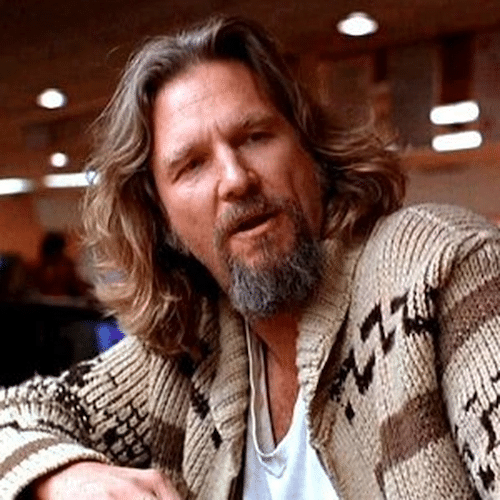
The Dude abides.
1998’s The Big Lebowski cemented “dude” as the go-to moniker for chill hombres. Jeff Bridges played “The Dude” and epitomized a laid-back and carefree lifestyle, inspiring the creation of a parody neo-religion called Dudeism. This movement embraces the philosophy of taking it easy and finding contentment in simple pleasures.
Alright my fellow dudes, now you know where the word dude came from.
It started off as a way to make fun of 19th-century hipsters and turned into a term of endearment.
Long live the dude.



